May 16, 2025 | 10:19 GMT +7
May 16, 2025 | 10:19 GMT +7
Hotline: 0913.378.918
May 16, 2025 | 10:19 GMT +7
Hotline: 0913.378.918
In recent years, the application of unmanned aerial vehicles (drones) in spraying pesticides to prevent and treat rice diseases has been favored by many farmers in Tam Nong district (Dong Thap).
Mr. Dang Minh Vuong in Phu Cuong commune, Tam Nong district, with 30 hectares of rice, is very satisfied when he hired a company to deploy drones to spray pesticides on his field. Mr. Vuong said: "Ever since I have this company's spraying drones, farmers have been very excited. Because the service cost is cheap while the spray is faster than employing someone to spray it. Spraying by flying drones does not require farmers to wade into the fields, trample on rice…”.
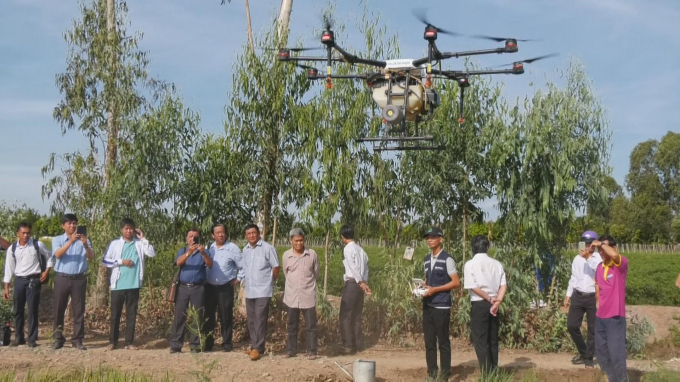
Farmers are very excited because the flying drones to spray pesticides are convenient and service cost is low. Photo: Trong Trung.
Mr. Nguyen Van Phuong in Tan Loi hamlet, Tan Cong Sinh commune (Tam Nong district) cultivates 40 hectares of rice fields, he has recently sown the summer-autumn rice crop in 2022. This is the 6th crop he has applied flying drones in spraying pesticides for prevention and control of rice pests. Initially when he uses a service drone with only 10 liters capacity to spray, now the drone has increased its capacity to 20 liters and able to carry a load of 52kg, it only has to spray from 7 am to about 12 noon to finish 400 workloads of rice fields.
This flying drone is both fast and cheap, costing only from 130,000 to 160,000 VND/time to spray per hectare, saving up to 6 million VND/ha/crop. Mr. Nguyen Van Phuong shared: “In the past, I had 3 acres of fields, spraying pesticides by hand took a lot of time and effort. Now, thanks to this flying drone, my work is done easily. I do a lot of farming, but I can't spray by hands all of my fields. Besides, now there is a shortage of labor to hire."
According to a technical staff working for a pesticide spraying service provider, one drone can spray 60ha/day, each flight it sprays 10,000m2 of rice fields, taking 10 minutes, 15 times faster than traditional spraying. Spraying pesticides in this method does not trample the rice during the spraying process, so it limits the impact on workers' health because they do not have to be in direct contact with chemicals.
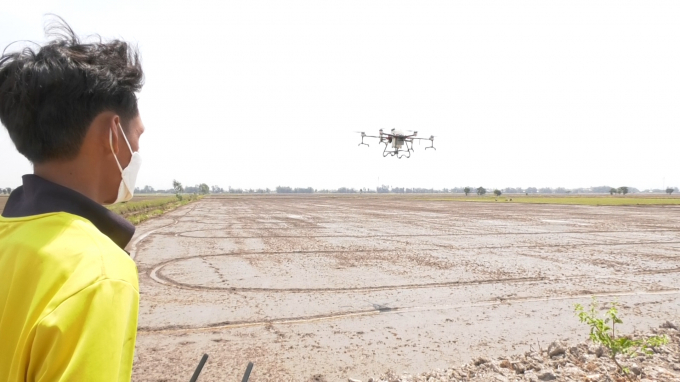
Currently, many farmers in Tam Nong (Dong Thap) are still "brave" in spending, they invest billions of dong to buy flying drones for home use and services. Photo: Trong Trung.
Seeing the convenience of flying drones in spraying pesticides, many farmers in Tam Nong district have boldly invested millions of dong, even billions in some cases, to acquire flying drones to spray pesticides for their own rice fields as well as to do services.
In 2020, Mr. Nguyen Van Hong in hamlet 5, Hoa Binh commune, Tam Nong district invested nearly 600 million VND to buy flying drones to spray pesticides for 40ha of rice fields. After that, Mr. Hong invested over half a billion dong to acquire another spraying drone that both worked in the fields and provided services for surrounding rice field owners.
Mr. Nguyen Van Hong did not hesitate to say: "In general, investing in flying drones worth nearly 600 million VND is a large amount of money, but after only one year applying in rice fields, the farmers will earn his capital back. The flying drone is still functional, excluding the maintenance costs to repair, I can still fly my drone normally. In the near future, I plan to invest in buying another fertilizer sprayer, spraying rice seeds for convenience, because labor is low, I work on my own rice fields, and if effective, I will provide services for neighboring people…”.
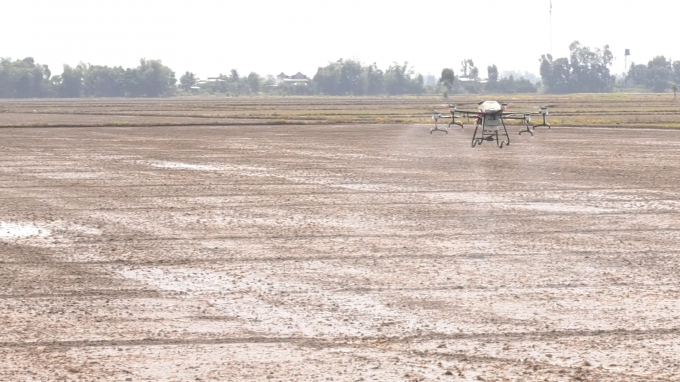
The scope, scale and capacity of the flying drones in spraying pesticides are getting expansive. Photo: Trong Trung.
According to Tam Nong district Department of Agriculture and Rural Development, the entire district currently has 65,000 hectares of cultivated rice land annually. The application of flying drones in spraying pesticides helps farmers prevent direct contact with the drug, reduce the number of spraying times; reduce production costs…
Mr. Luu Van Tien, Deputy Head of Tam Nong district Department of Agriculture and Rural Development said: The Department of Agriculture and Rural Development will continue to deploy the model of spraying pesticides using flying drones to continue to evaluate its effectiveness, evaluate the technical process of using equipment in safely and effectively spraying pesticides for rice. In addition, a pilot model of using drones will be deployed for sowing and spraying fertilizers, in combination with pesticides to help further reduce costs in rice production.
Translated by Nguyen Hai Long

(VAN) Vietnam’s TH Group officially put its high-tech fresh milk processing plant into operation in the Russian Federation, marking a historic moment as the first TH true MILK cartons were produced in Russia.

(VAN) Use of high-quality broodstock and biotechnology is regarded as the most effective approach to ensuring sustainable and economically viable shrimp aquaculture ahead of climate change and the emergence of increasingly intricate disease patterns.

(VAN) Carbon farming is a form of agricultural practices that helps absorb more greenhouse gases than it emits, through smart management of soil, crops, and livestock.

(VAN) This is a key content of the Memorandum of Understanding recently signed between the Vietnam Fisheries Society and Kunihiro Inc of Japan.

(VAN) To achieve the goal, local authorities and businesses in Kon Tum province have fully prepared the necessary conditions for the new Ngoc Linh ginseng planting season.
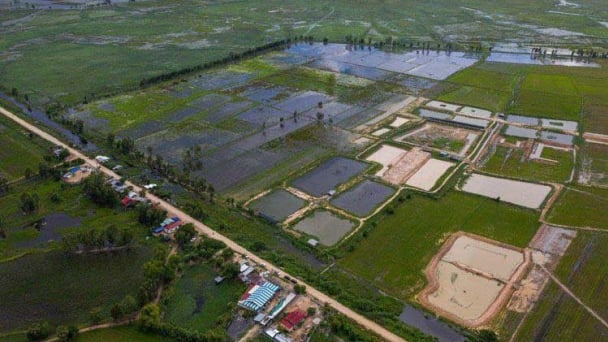
(VAN) Jiangsu province is gearing up to host training programs in Phnom Penh, the capital of Cambodia, this year to establish the Fish and Rice Corridor.
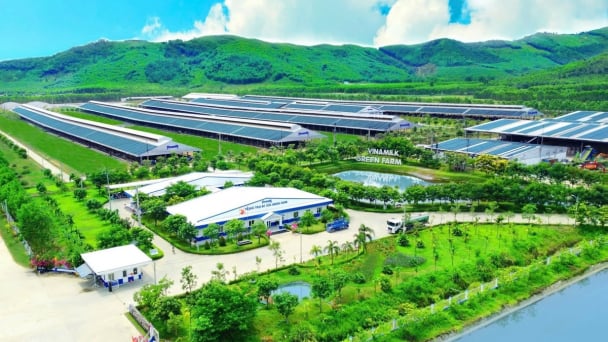
(VAN) Le Hoang Minh, representing Vinamilk, shared the company's experience in energy saving and green energy transition for production at a workshop held during the P4G Summit.